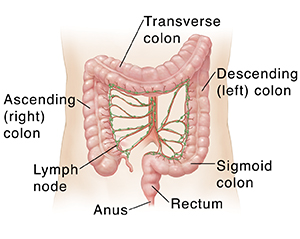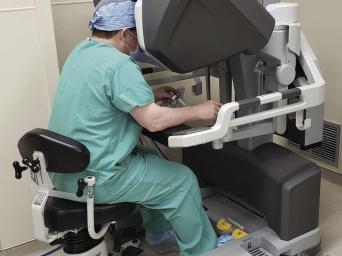Colorectal Cancer
Saint Luke’s Cancer Specialists provide early detection, expert diagnosis, personalized treatment options, and survivorship support to every patient. We are committed to providing comprehensive care for patients with colon or rectal cancers, offering personalized care and treatment plans individualized for each patient’s specific needs.
What Is Colon and Rectal Cancer (Colorectal Cancer)?
What Is Colon and Rectal Cancer (Colorectal Cancer)?
Cancer starts when cells in the body change (mutate) and grow out of control. These cells can form lumps of tissue called tumors. Cancer that starts in the cells of the colon is called colon cancer. Cancer that starts in the cells that make up the rectum is called rectal cancer. These cancers are a lot alike. They're sometimes just called colorectal cancer.

Understanding the colon and rectum
The colon and rectum make up the large intestine (also called the large bowel). The colon is a muscular tube that's about 5 feet long. It forms the last part of the digestive tract. It absorbs water and stores food waste. The rectum is the last 6 inches of the large intestine.
The colon and rectum have a smooth inner lining. It is made of millions of cells. These cells replace themselves every day to keep the lining healthy. Changes in these cells can lead to growths in the colon and rectum that can become cancer.
When the colon lining changes
Changes that happen in the cells that line the colon or rectum include:
-
Polyps. These are fleshy clumps of tissue that form on the inner lining of the colon or rectum. Small polyps are usually benign (not cancer). But over time, cells in a type of polyp known as an adenomatous polyp (or adenoma) can change and become cancer. The longer a polyp is there and the larger a polyp grows, the more likely it is to become cancer. This happens over a period of years. That's why these growths should be removed when possible. Removing polyps early may prevent cancer from forming.
-
Colorectal cancers. These usually start when polyp cells grow out of control. As cancer grows, it can invade the deeper layers of the colon or rectal wall. Cancer can grow beyond the colon or rectum and into nearby organs as time goes on. It can spread to nearby lymph nodes. The cancer cells can also travel to other parts of the body. This is known as metastasis. The sooner a cancer tumor is removed, the better the chance of keeping it from spreading.
Treatment choices for colon and rectal cancer
You and your healthcare provider will decide on the treatment plan that’s best for your needs. Treatment choices can include:
-
Surgery. This is the most common treatment. It's done to remove the cancer in the colon and rectum. Some nearby tissue is also removed. This may include nearby lymph nodes.
-
Chemotherapy. This treatment may be done along with surgery. Or it may be done instead of surgery if the cancer has spread. Strong medicines are used to kill cancer cells. This is called systemic therapy. It works throughout the body. Chemotherapy is often done as an outpatient procedure in a healthcare provider's office. It is also done at a clinic or hospital. You may take the medicine as a pill. Or you may get it through an intravenous (IV) infusion. This slowly releases the medicine into your blood.
-
Radiation therapy. This treatment may be used for rectal cancer. High-energy X-rays are focused on the tumor to kill cancer cells. It’s known as localized therapy. It targets the cancer and not the whole body. It's usually done on an outpatient basis in a hospital or radiation clinic.
-
Targeted therapy. This treatment uses medicines that target certain genes, proteins, or cell functions that help cancer cells grow. Cancer cells are tested to see if they have the changes the medicines target. Sometimes targeted therapy is given along with chemotherapy. It can also be used by itself.
-
Immunotherapy. This treatment uses medicines that help the body's immune system attack the cancer. These medicines can be helpful in treating colorectal cancers that have certain gene changes. Immunotherapy might be a choice for advanced colorectal cancers with these changes. It may also be used if chemotherapy hasn't worked.
Treatment Choices
Colorectal Cancer: Treatment Choices
There are many treatment choices for colorectal cancer. Which may work best for you? It depends on a number of factors. These include the cancer type, the tumor size and where it is, and the stage of the cancer. Factors also include your age, overall health, and what side effects you’ll find acceptable.
Learning about your treatment choices
You may have questions and concerns about your treatment choices. You may also want to know how you’ll feel and function after treatment, and if you’ll have to change your normal activities.
Your healthcare provider is the best person to answer your questions. They can tell you what your treatment choices are, how well they’re expected to work, and what the risks and side effects are. Your healthcare provider may advise a specific treatment. Or you may be presented more than one potential treatment course and be asked to offer your opinion on the best choice for you. It can be hard to make this decision. It's important to take the time you need to make the best decision.
Deciding on the best plan may take some time. Talk with your healthcare provider about how much time you can take to explore your choices. You may want to get another opinion before deciding on your treatment plan. You may also want to involve your family and friends in this process.
Understanding the goals of treatment for colorectal cancer
For many colorectal cancers, the goal of treatment is to cure the cancer. If cure isn't possible, treatment may be used to shrink the cancer or keep it under control for as long as possible. Treatment can also improve your quality of life by helping control the symptoms of the disease. The goals of colorectal cancer treatment can include:
-
Remove the cancer in the colon or rectum
-
Remove or destroy tumors in other parts of the body
-
Kill or stop the growth or spread of colorectal cancer cells
-
Prevent or delay the cancer's return
-
Ease symptoms caused by the cancer, like pain or eating problems caused by pressure on organs
Types of treatment for colorectal cancer
Many types of treatment can be used for colorectal cancer. Different combinations of treatment may be used, depending on the stage of the cancer and other factors. Each treatment has its own goals. Here's an overview of each type of treatment:
Surgery
This is the most common treatment for most early stages of colon and rectal cancer. The goal of surgery is to remove the entire tumor and any cancer cells that may have spread to nearby tissue. Depending on the stage of the cancer, surgery may be all that's needed. Or surgery may come before or after another treatment is used.
Chemotherapy
The goal of chemotherapy (chemo) is to stop cancer from growing or spreading. It does this by using medicines to either kill the cells or stop them from dividing. If chemo is given in a way that puts the medicines into the bloodstream, it treats cancer cells throughout the body. This way chemo can treat cancer that has spread. This is called systemic treatment. Chemo can also be given to attack cancer cells in certain organs, such as the liver. This is called local treatment. Chemo might also be used before surgery to shrink tumors. When used before surgery, it's called neoadjuvant therapy. It might be used after surgery to kill or control any remaining cancer cells. When used after surgery, it's called adjuvant therapy.
Radiation therapy
The goal of radiation therapy is to kill cancer cells using high-energy X-rays. It has a major role in treating rectal cancers, but it may be used in some colon cancers as well. Like chemotherapy, it may be used before surgery to shrink tumors. This is called neoadjuvant radiation therapy. This may lower the chance that a person will need a permanent colostomy. When it's used after surgery, it's called adjuvant radiation therapy. Then the goal is to reduce the chance that the cancer will come back.
Targeted therapy
This treatment uses medicines that target proteins or cell functions that help cancer cells grow. Some of these medicines are given along with chemotherapy, while others are used by themselves. The goal is to keep the cancer from growing. It may also be used to help chemo get inside the tumor. This can help it work better.
Immunotherapy
The goal of this treatment is to help the body's own immune system kill the cancer cells. Medicines called checkpoint inhibitors can be used to treat some advanced colorectal cancers in which the cells have certain gene changes. This treatment might be a choice for some people who have already had chemotherapy.
Ablation and embolization
These methods can be used to treat tumors that have spread to other parts of the body, such as the liver or lungs. Ablation is the use of heat, cold, or other methods to destroy tumors rather than removing them. For embolization, a substance is injected into a blood vessel to try to cut off a tumor's blood supply or to send chemotherapy or radiation right to the tumor.
Stenting
If the cancer is blocking your colon, your healthcare team may recommend a stent. A stent is a hollow mesh tube. It helps keep your colon open so gas and stool can pass. This may help improve symptoms. A stent may be used as part of supportive care or before a larger surgery.
Supportive care
Your healthcare provider may advise therapies that help ease your symptoms, but don’t treat the cancer. These are used along with other treatments. For example, supportive care can be medicines to prevent nausea or control pain.
Clinical trials for new treatments
Researchers are always looking for new ways to treat cancer. These new methods are tested in clinical trials. Talk with your healthcare provider to find out if there are any clinical trials you should consider.
Talking with your healthcare provider
At first, thinking about treatment choices may seem overwhelming. Talk with your healthcare providers, nurses, and loved ones. Make a list of questions. Think about the benefits and possible side effects of each choice. Talk with your healthcare provider about any questions or concerns before making a decision.
Providers

Norin Ansari, MD, MPH

Juliet Gyamfua Appiah, MD

Sreekanth Donepudi, MD

Benjamin J Kulow, MD

Sashidhar Manthravadi, MD

Megan E McNally, MD

Marc T Roth, MD

Eston James Schwartz, MD

Addison R Tolentino, MD






